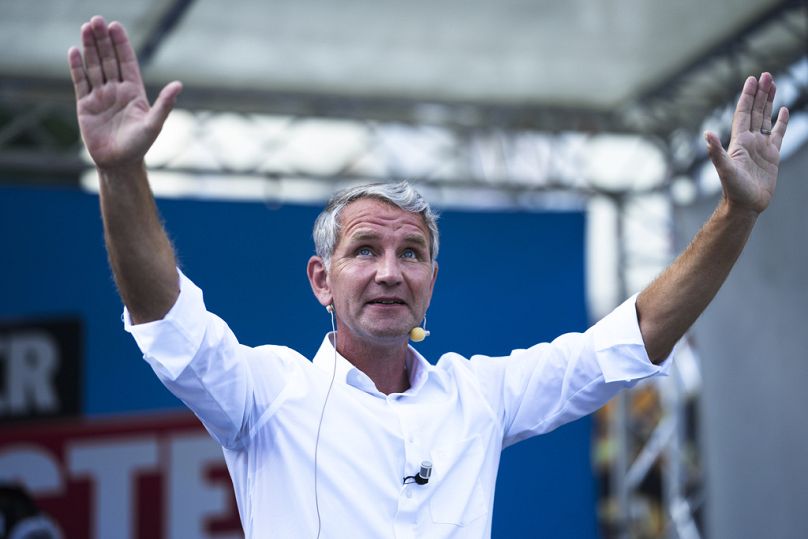Here's a quick roundup of the four main things we learned from this weekend's elections in Saxony and Thuringia.
The far-right Alternative for Germany (AfD) party achieved the first electoral victory in its history in this weekend's vote, which saw the eastern states of Thuringia and Saxony head to the polls.
 ADVERTISEMENT
ADVERTISEMENT
 ADVERTISEMENT
ADVERTISEMENT
In Thuringia, the much-criticised hard right party scored a clear win with about 33% of the vote, and in neighbouring Saxony, it won around 30%, coming in a close second.
Meanwhile, the months-old leftist party led by the former Die Linke leader Sahra Wagenknecht, BSW, came in third in both states.
Voters punished the three parties in Chancellor Olaf Scholz's governing coalition, which took well under 15% of the vote between them.
While only regional, the elections are likely to have a wide-reaching impact on Germany's nationwide politics and, by extension, European policy.
Here are Euronews' four main takeaways from the weekend.
Major far right victory shakes up status quo
The main thing to remember from the vote is the success of the AfD, which won 32.8% of the vote in Thuringia — well ahead of the centre-right Christian Democratic Union (CDU), the main national opposition party, with 23.6%.
In neighbouring Saxony, local projections put support for the CDU — which has led the state since German reunification in 1990 — at 31.9%, and the AfD breathing down its neck at 30.6-30.7%.
Compared to the last state elections five years ago, the AfD's gains in Thuringia were substantial.
"This is a historic success for us," Alice Weidel, a national co-leader of AfD, told domestic media, describing the result as a "requiem" for Chancellor Olaf Scholz's ruling federal coalition.
Meanwhile, their opponents called for caution.
"An openly right-wing extremist party has become the strongest force in a state parliament for the first time since 1949, and that causes many people very deep concern and fear," said Omid Nouripour, a leader of the Greens, one of the parties in the national governing bloc.
Other parties say they won't put AfD in power by joining it in a coalition. Even so, its strength will likely make it extremely difficult to form new state governments while keeping it out, forcing the rest into exotic new coalitions.
The AfD's leader in Thuringia, Björn Höcke, warned that creating a governing coalition without his party "would not be good for the state".
"Whoever wants stability in Thuringia has to integrate the AfD," he said.
Deep discontent with a national government notorious for infighting, anti-immigration sentiment and scepticism toward German military aid for Ukraine are among the factors that have contributed to support for populist parties in the region less prosperous than western Germany.
Success for new leftist party
On the other side of the political spectrum, the left-wing populist BSW also had a solid showing, taking 15.8% of the vote in Thuringia and nearly 12% in Saxony.
Its eponymous leader, Wagenknecht, quit the left Die Linke party last year to form her own in January, now outperforming her old political home.
Wagenknecht, a self-described "left conservative," celebrated her months-old party's success in this weekend's elections, underlining its refusal to work with AfD's Höcke and adding she hopes it can form "a good government" with the conservative CDU.
The BSW combines left-wing economic policy with an anti-immigration agenda. The CDU has also stepped up pressure on the national government to take a tougher stance on immigration, so this is one area where the parties may see eye to eye.
Good news for Russia
The Kremlin could also be seen as an indirect winner of these German state elections, as both the AfD and the BSW are said to have close ties with Moscow and are against supporting Ukraine in the face of Russia's ongoing full-scale invasion.
Despite sitting on opposite ends of the political spectrum, the AfD and the BSW agree on their staunch criticism of any military engagement in the war, criticising the role of the US and NATO and instead pushing for closer ties with Russia when it comes to European security.
They've also been harsh critics of the aid that Europe and the US have already provided Ukraine since early 2022. When Ukraine's President Volodymyr Zelenskyy asked the Bundestag for more support in June, many MPs from both the AfD and the BSW left in protest.
Germany's stance toward Russia's war against Ukraine is a sensitive issue in the east, linked to the region's history as the former state of East Germany — a close ally of the Soviet Union at the time.
Berlin is Ukraine's second-biggest weapons supplier after the US. While the state elections have no bearing on Germany's foreign policy, both parties will surely interpret their success as a sign that people support their views on Russia and Ukraine.
Pressure on the federal government
The results have put both Chancellor Scholz's ruling federal coalition government and the CDU in a bind.
Voters in Saxony and Thuringia punished the three parties in the governing coalition—Scholz's Social Democratic Party (SPD), the Greens, and the liberal Free Democratic Party (FDP)—which took slightly more than one-eighth of the vote between them.
The debacle added to the bloc's woeful performances in the European elections in June, and it's unclear whether they have any recipe to turn things around with Germany's next national election due in just over a year.
Another state election on 22 September in another eastern region — Brandenburg, which, unlike the two that voted on Sunday, is currently led by Scholz's centre-left SDP — could add to their embarrassment.
Voters "wanted to send a signal to Berlin above all," Jens Spahn, a senior CDU MP, told ZDF television. "They want to send a signal to the (coalition) that the chancellor no longer has their confidence. Olaf Scholz is the face of failure in Thuringia and Saxony too."
However, the two elections also bring difficult decisions for the CDU, which leads national polls. AfD now holds more than a third of the seats, at least in Thuringia's state legislature—which would, for example, allow it to block appointments of judges to the regional constitutional court—and that will make it hard to build workable governments.
In Thuringia, even a previously improbable combination of the CDU, Scholz's party and the new leftist BSW lacks a majority.
To get one, the conservatives would also need help from Die Linke, which descended from East Germany's communist rulers and led the outgoing state government. So far, they have refused to work with it.












